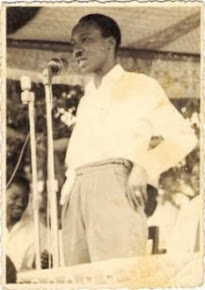The news of Steve Kanumba’s sudden death seemed like a fictitious scene from a horror movie; you see a character dying but your instincts remind you that it’s just a movie and that the actor is still alive in actual life.
 Unfortunately, the case of Kanumba is different; he is dead. And such a bitter truth may take a long time for the family and fans of the actor to come to terms with the fact that the young man who worked so hard to achieve success in his acting career had his life cut short before his full potential could be realized.
Unfortunately, the case of Kanumba is different; he is dead. And such a bitter truth may take a long time for the family and fans of the actor to come to terms with the fact that the young man who worked so hard to achieve success in his acting career had his life cut short before his full potential could be realized.I rarely interact with local actors. But last month I found myself in the company of Mr. Kanumba, arguably this country’s most charming actor. As the news of his untimely death reached me today, it made me remember a scene which led to that first encounter with him a few weeks.
His childhood friend, Bongo Flava artist Haji Nurah told him a journalist wanted to see him, and he agreed, and chose our meeting to take place at Sinza Vatican one chilly Friday evening.
Upon arriving there, we drove through a small path and finally parked in front of a moderately luxurious house where three cars, a Lexus and two others, were parked.
“They are all Kanumba’s,” Nurah slowly whispered.
We were invited into the living room, which was neatly decorated with silver ornaments and white painted walls and well placed curtains with a comfortable sofa set. The elegant space gave an impression one sees reflected in the perfectionism that characterised his movies, his fans tell me.
After waiting for ten minutes, a young man emerged from a room in shorts and a sleeveless T-shirt. His face bared a sad smile and he seemed slightly unsettled.
The night before, he had had a slight car accident and a fight with his girlfriend. He chose not reveal who the lady was.
From what I read in gossip newspapers about how people of Mr. Kanumba’s caliber enjoy Dar es Salaam’s night life, especially on weekends, I was slightly surprised to find him indoors. He said that the previous night’s complications had made him switch off his mobile phones. As I scanned the room, it probably also moved him to take a few sips from one of the empty whisky bottles we saw lying on a dining table and sleep.
Before I was officially introduced to him, he politely told me how he was frustrated with fame but was struggling to cope with the reality that it was something he couldn’t escape.
He said that most texts he received on a daily basis were from people begging for money and those he encountered at social gatherings would unjustifiably ask for a free drink even if he was meeting them for the first time.
“It is frustrating,” he said gloomily and added, “It is something I have recently learnt to control otherwise I will not make any headway as an actor if I choose to dish out money to everyone.”
One of the tactics he was employing in order to stay away from such people was to remain indoors or travel. He told me of some lucrative acting deals he had secured in Accra, Ghana and Lagos, Nigeria.
I asked him what he thought his increasing base of supporters would feel now that he has decided to estrange himself from them?
“No”, he responded. He told me that he had recently bought a Blackberry so he can stay connected with his fans on social media.
I must confess that I wasn’t a keen supporter of his movies or of other African actors before I met him but two hours into our conversation I started feeling guilty about my dismissive attitude to such movies, that they were of low quality and started to realize that this type of thinking does a disservice to ambitious young Tanzanians like him.
I apologized to him but he brushed it off and said I wasn’t alone; most people he had met felt the same, that local movies were unprofessional and their content lacked substance. He went on to suggest that it was upon those in the industry to prove their critics wrong.
But he sounded grateful of what he had achieved, not only materially but he felt that he had made the Tanzanian film industry more respectable.
When he ventured into acting a few years ago, he never expected life would turn out as successfully as it had. After all, he said, he started acting when most people viewed the profession as meant for people who had failed in life and that there was very little hope for most actors and actresses.
We talked until about 8pm when his brother, whom he lived with, hinted that a mechanic who had been repairing his bruised Lexus had brought the car and was demanding Tsh 700,000. This is when I realised that we had yet to talk about why I had asked for a meeting with him.
As we were winding down our conversation, he told me that he was jealous that his friend Haji Nurah had managed to juggle studies and music and had finally earned his degree in Information Technology.
“I must also go back to school soon,” he said.
As he walked me out he asked me if we could get together after my forthcoming trip abroad. I nodded in agreement and proposed that we meet the first week of April.
When I returned nearly a week ago, I planned to call him on Saturday, to ask him if we could get together on Monday for drinks. That was before the news of his untimely death announced itself on social media.
Erick Kabendera is a freelance journalist with The Times of London and Africa Confidential. He has written for The (British) Independent, The (Tanzania) Guardian and The Citizen. He lives and works in Dar es Salaam, Tanzania.
Source: http://the-waywardpress.tumblr.com/post/20653873216
Tupe maoni yako










.JPG)









.jpeg)




The cholesterol is of two types, which are - Bad cholesterol,
ReplyDeleteis also known as low density lipoprotein honorable cholesterol, is LDL particles and are more atherogenic or more than probable
to effort coronary artery disease.
Look at my web site cholesterol home remedies indian high
my webpage :: cholesterol home remedies indian high